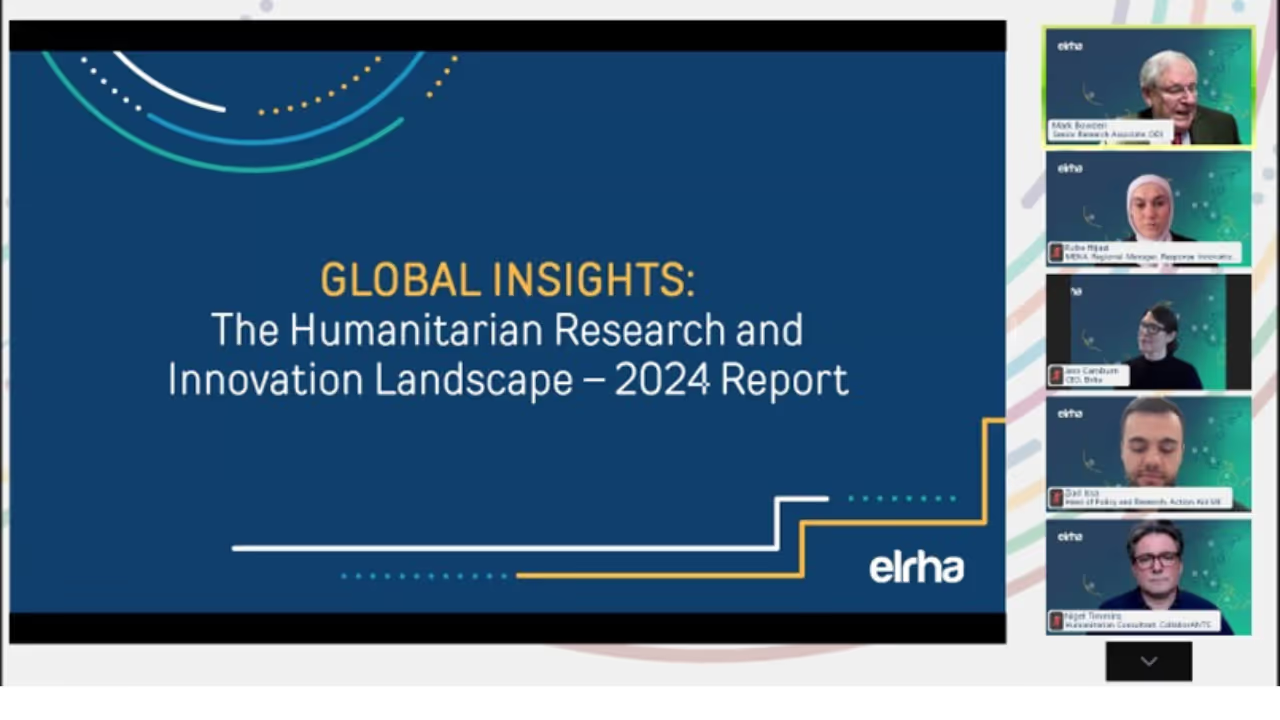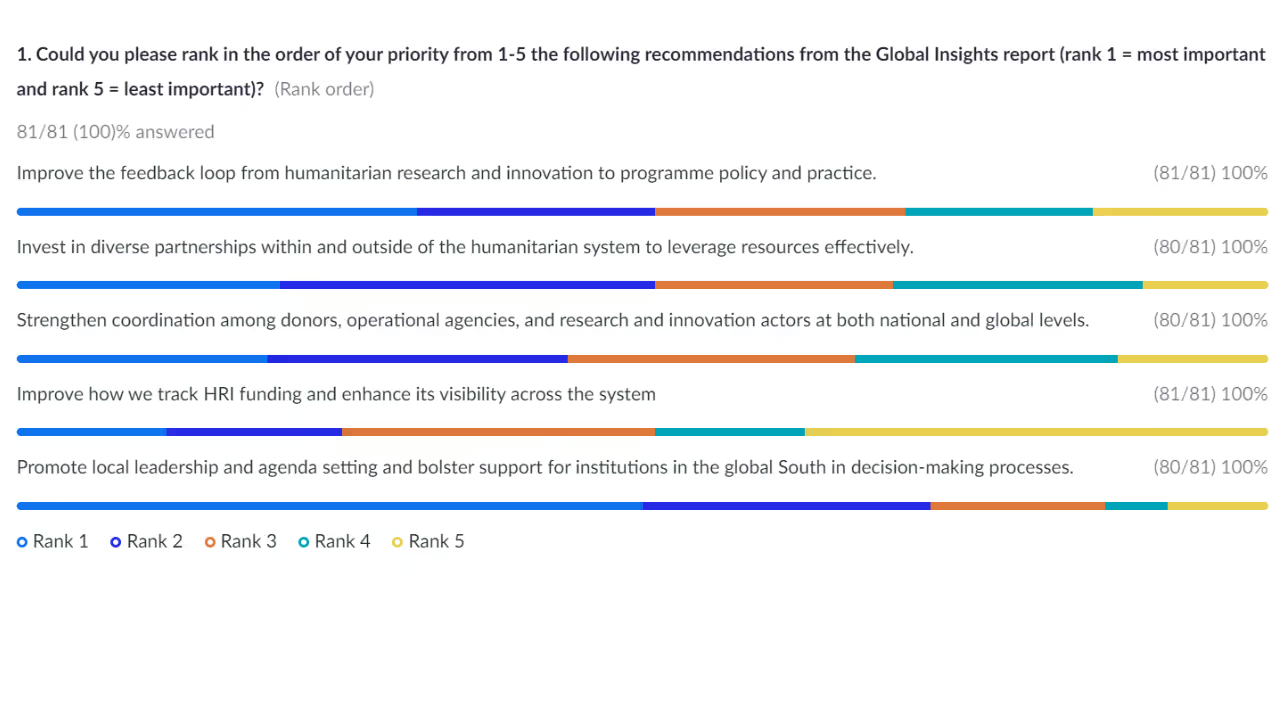Five takeaways from the launch of our Global Insights report

To mark the launch of our landmark publication, Global Insights: The Humanitarian Research and Innovation Landscape – 2024 Report, we invited leaders from the humanitarian research and innovation (HRI) community to explore and discuss the ideas revealed.
The panellists, including from the Research Innovation Lab, HelpAge International and the International Rescue Committee, shared insights on investment, impact, uptake and equity across the HRI sector.
During the event we polled attendees on which of the five key recommendations outlined in the report they considered the highest priority. The results found that promoting local leadership and Global South decision-making was of highest priority to attendees. The poll also showed significant support for improving the feedback loop between HRI and programme policy and practice to ensure research findings can be effectively used by operational agencies. See the full results from the poll below.

These recommendations were all addressed by our panellists throughout the event (which you can watch back here) and we’ve captured the key takeaways from the discussion.
We must improve the feedback loop from research and innovation into programme policy
Currently, the connection between HRI findings and programme policy changes is weak, mainly due to challenges translating research findings into practical outputs relevant to operational practitioners.
Accessibility is key to this process. Publishing findings is not enough, HRI research needs to be presented in a way that everyone understands. Practitioners can be skeptical of research, especially if the findings diverge from their real-world experiences. However, by communicating clearly, understanding the humanitarian system and its operations, acknowledging barriers as well as the opportunities, resistance can be transformed into engagement.
Research findings need to move beyond presentations to practical advice and tools that can be used directly by operational actors. We must seize every opportunity for dissemination to ensure widespread awareness of the latest solutions and innovations.
We should be strengthening relationships outside the traditional humanitarian sector
While significant resources and capacities exist within the global research sector, we need to articulate and engage with non-humanitarian research funders about how the issues addressed within HRI are of mutual interest, such as the impacts of climate change. There is more to private sector collaboration than just investment; it brings opportunities to adopt and adapt existing innovations or methodologies from these sectors that could be of use to humanitarian efforts.
However, there are significant gaps in research and limited information about what non-traditional research and innovation (R&;I) actors need or want from engaging in HRI. The focus for now should be sharing success stories of cross-sector collaboration to incentivise engagement, address concerns about market viability and develop accessible and relevant ethical frameworks for partnerships.
Too much HRI is driven by supply rather than demand
Institutions and organisations from high-income countries hold the vast majority of leadership roles in HRI, and actors from the Global North predominantly determine the agenda. Across the sector, decision-making processes remain largely top-down, with headquarters in the Global North continuing to make decisions, with lower-tier offices implementing them, and local actors and communities frequently excluded from early-stage discussions.
For meaningful impact, the needs of communities affected by crisis should be correctly identified. R&;I created by or with local actors is more likely to directly address issues where they are happening. However, many local innovators don’t identify themselves as such; they are simply finding solutions to everyday challenges. Contextual and community knowledge is key to understanding these challenges and for finding solutions from within.
We need to improve HRI coordination and consensus among and between donors and operational agencies
Currently, there is no real coordination body for HRI, and consequently there is no common agenda. R&;I in the humanitarian space remains siloed, responding to organisational priorities rather than system or country needs. To make HRI truly impactful, we need to better support the role of local leadership - as with agenda setting, local actors and marginalised voices are not always included within coordination mechanisms. Intentional support is needed across the humanitarian community to achieve this, with donors playing a key role – supporting existing local platforms, civil society networks or national groups, and advocating to agencies and coordinating bodies that local actors need a seat at the table.
At a global level, organisations and agencies need to establish priorities for R&;I and contribute to a system-wide picture of where the gaps are. At the country level, the Clusters should engage local groups in discussions on planned R&;I to ensure it aligns with actual needs.
Greater and more flexible funds are required to support HRI impact
While the report highlights a significant doubling of resources in HRI over the past five years, we must focus and improve how our funding is structured. Particularly important are flexible funds that allow us to pivot resources if investments are not the most effective, and to double down on those that are.
To optimise these resources, we need to invest in the most pressing questions and thematic areas, remain adaptive and responsive throughout the scaling pipeline, and continuously assess community value, cost efficiency, and return on investment (ROI at each stage. This enables us to reallocate investments as we go, to really drive for greater impact.
[.slimline-cta-box][.slimline-cta_heading]Find out more[.slimline-cta_heading][.slimline-cta_paragraph]We’ll be sharing more from our Global Insights report, its recommendations and its potential for improving HRI policy and practice soon. Stay up to date with all the latest news on this by subscribing to our newsletters.
You can explore our previous outputs and reports which fed into the Global Insights report.[.slimline-cta_paragraph][.slimline-cta-box]
Stay updated
Sign up for our newsletter to receive regular updates on resources, news, and insights like this. Don’t miss out on important information that can help you stay informed and engaged.
Explore Elrha
Learn more about our mission, the organisations we support, and the resources we provide to drive research and innovation in humanitarian response.